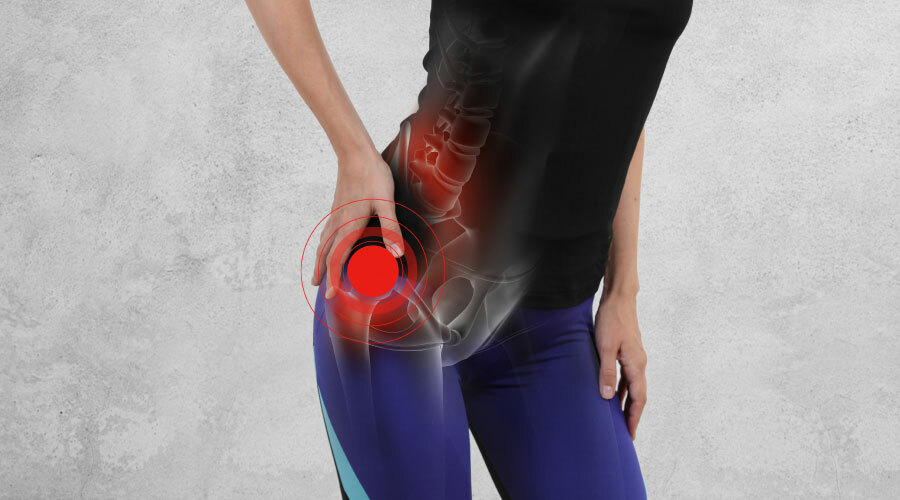
Hip pain is a common issue for athletes of all types—whether you’re a student-athlete pushing your limits on the field or a weekend warrior trying to stay active. One of the most prevalent causes of hip pain is overuse, a condition that develops when the hip joint is subjected to repetitive stress and activity without sufficient recovery time. Understanding how overuse injuries occur and how to prevent them can help you stay in the game longer and reduce the risk of long-term damage.
What is an Overuse Hip Injury?
An overuse hip injury occurs when repetitive motion, often from running, jumping, or other high-impact activities, leads to stress and strain on the hip joint. Over time, this repeated pressure can cause inflammation, irritation, and wear-and-tear on the muscles, tendons, and ligaments surrounding the hip.
Some common overuse hip injuries include:
- Tendinitis: Inflammation of the tendons due to repetitive movement.
- Bursitis: Inflammation of the fluid-filled sacs (bursae) that cushion the joints.
- Hip Flexor Strains: Tears or stretching of the muscles that help lift the leg.
- Labral Tears: Tears in the cartilage that lines the hip socket.
Recognizing Hip Overuse Symptoms
If you’re dealing with hip pain, it’s crucial to recognize the early symptoms of an overuse injury. Common signs include:
- Aching or sharp pain in the hip, especially after activity.
- Stiffness in the hip joint, particularly in the morning or after sitting for long periods.
- Swelling or tenderness around the hip area.
- Decreased range of motion or difficulty performing activities that involve the hip.
If you’re experiencing any of these symptoms, it’s important to take action before the pain escalates into a more serious injury that could sideline you for an extended period.
How to Prevent Hip Overuse Injuries
Prevention is key to keeping your hips healthy and avoiding the pitfalls of overuse injuries. Here are some strategies to help protect your hips:
1. Warm Up Properly
Before any physical activity, always take the time to warm up your muscles. A good warm-up routine should include dynamic stretches and movements that engage your hip muscles, such as leg swings, lunges, and gentle squats. This helps prepare the hip joint for the stresses of exercise and reduces the likelihood of strain.
2. Cross-Train
Relying too heavily on one activity can put repetitive stress on the hip joint. Cross-training allows you to work different muscle groups and give the hips a break from constant impact. For example, if you’re a runner, consider cycling or swimming to vary your training routine.
3. Listen to Your Body
Pushing through pain might seem like the way to go, but it’s crucial to listen to what your body is telling you. If you feel discomfort or pain in your hip, don’t ignore it. Taking rest days, modifying your workout, or seeing a healthcare provider early can prevent more severe injuries down the road.
4. Strengthen Your Core and Hips
A strong core and hip muscles provide better support to the hip joint and can prevent undue stress on it. Incorporate exercises like planks, bridges, and hip thrusts into your routine to improve strength and stability.
5. Gradually Increase Intensity
When increasing the intensity or volume of your workouts, do so gradually. Sudden increases in activity levels can overwhelm the hip joint and lead to overuse injuries. Use the 10% rule: increase your activity load by no more than 10% each week.
6. Use Proper Technique
Whether you’re running, lifting weights, or participating in other sports, using proper form is essential. Poor posture or improper technique places excess strain on the hips and can lead to injury over time. Work with a coach or trainer to ensure you’re moving correctly and efficiently.
7. Get Enough Rest
Rest is an often overlooked but essential component of any training regimen. Adequate sleep and recovery time between workouts allows the body to repair itself and reduce the risk of overuse injuries. Incorporating rest days into your weekly schedule will help your hips stay in peak condition.
When to Seek Professional Help
If you’re dealing with persistent hip pain or suspect an overuse injury, it’s important to seek medical attention. A healthcare provider can evaluate the cause of your pain and recommend the best course of treatment, which may include physical therapy, rest, or in some cases, imaging tests to rule out more serious injuries.
At Access Sports Medicine, our team of experts can help diagnose and treat hip injuries, ensuring that you can return to your favorite activities as safely and quickly as possible.
Get Expert Help for Hip Pain and Overuse Injuries
Hip pain from overuse is common among athletes, but with the right strategies in place, it’s preventable. By warming up properly, cross-training, listening to your body, and strengthening your muscles, you can protect your hips and stay active without the risk of overuse injuries.
If you’re dealing with hip pain or want to take proactive steps to prevent overuse injuries, contact Access Sports Medicine today. Our expert team is here to help you stay at your best and ensure a safe, speedy recovery. Get in touch with us now to schedule an appointment and start your path to recovery!


